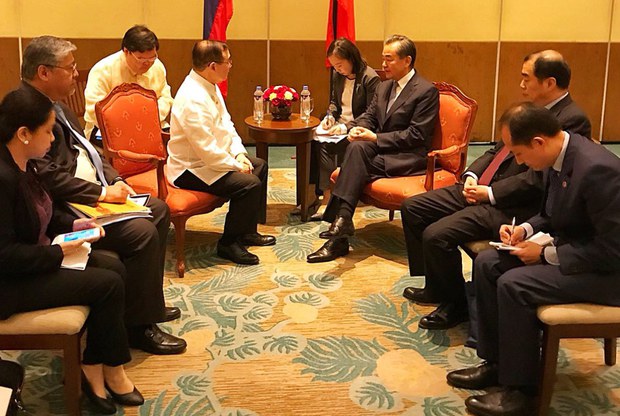Top Philippine Diplomat: South China Sea Code Might Not be Achieved
2018.10.29
Davao, Philippines
 Philippine Foreign Secretary Teodoro Locsin (center left), meets with Chinese Foreign Minister Wang Yi in Davao, Philippines, ahead of Chinese President Xi Jinping’s planned visit in November, Oct. 29, 2018. Philippine Foreign Secretary Teodoro Locsin (center left), meets with Chinese Foreign Minister Wang Yi in Davao, Philippines, ahead of Chinese President Xi Jinping’s planned visit in November, Oct. 29, 2018.
Philippine Foreign Secretary Teodoro Locsin (center left), meets with Chinese Foreign Minister Wang Yi in Davao, Philippines, ahead of Chinese President Xi Jinping’s planned visit in November, Oct. 29, 2018. Philippine Foreign Secretary Teodoro Locsin (center left), meets with Chinese Foreign Minister Wang Yi in Davao, Philippines, ahead of Chinese President Xi Jinping’s planned visit in November, Oct. 29, 2018.
A legally binding code of conduct to govern actions by Beijing and other claimants in the South China Sea might not be attained, the Philippines said Monday, two months after the ASEAN regional bloc announced a breakthrough in related negotiations.
Teodoro Locsin, the newly appointed Philippine foreign secretary, made the comments after meeting with his Chinese counterpart and after the chief of U.S. naval operations stressed that his country would continue to advance “freedom of navigation” in the disputed sea region.
“Perhaps, we will not be able to arrive at a legally binding COC but it will be the standard on how people of ASEAN, governments of ASEAN will behave toward each other – always with honor, never with aggression and always for the mutual progress,” Locsin said at a joint news conference with his Chinese Foreign Minister Wang Yi, referring to the so-called Code of Conduct.
Rival territorial claims are a burning issue that must be resolved between the 10-member Association of Southeast Asian Nations (ASEAN) and China, but there is no reason why joint cooperation cannot move forward, Locsin said.
Apart from China and Taiwan, the Philippines and fellow ASEAN countries Brunei, Malaysia and Vietnam have overlapping claims in the sea.
The Philippines and the other ASEAN claimant states have been pushing for a legally binding code. In August, China agreed to a draft that would eventually serve as its basis.
Officials said the code would spell out legal parameters of what each claimant state could do in a bid to avoid the disputes from spiraling out of control. Some countries want the code to be binding and subject to ratification by signatory states.
Wang said China would follow the final agreement, saying that “whether or not it is legally binding, any document we have signed we will strictly abide by it and firmly implement it.”
He said the relationship between the Philippines and China had improved significantly since President Rodrigo Duterte took office in 2016 and that the situation in the South China Sea was “improving and getting more stable.”
“Countries concerned have come back to the table of dialogue and negotiations and consultations to properly handle the differences,” Wang said. “Together with ASEAN countries, China and these countries are jointly upholding peace and stability.”
He said Chinese officials were looking forward to working with ASEAN and other claimants as they stepped up efforts.
China, in particular, was ready to discuss with the Philippines joint development of oil and gas in the disputed region, a proposal that “contains political wisdom,” Wang said.
“If our two countries can have joint development without prejudice to each other’s sovereign claim, that will help resolve a potential energy shortage in the Philippines,” he said. “It will also provide a practical way for China and the Philippines to properly handle the related differences.”
What’s more, if the joint venture goes ahead without a hitch, it would set an example for similar cooperation efforts between China and other claimants, he said.
The two countries are working on a proposal to jointly develop the area, with a 60 percent to 40 percent sharing deal favoring the Philippines.
No details have been finalized, but Philippine officials had said the project could take place in Reed Bank. The area lies within Manila’s exclusive economic zone, which is believed to lie atop rich natural deposits, and joint exploration there is against the Constitution.
Xi plans visit
Philippine and Chinese officials also discussed Chinese President Xi Jinping’s planned November visit, which, they said, could signal an increase in cooperation between the two countries.
Previously, Chinese officials had expressed concern over what they claimed were planned U.S.-led maritime exercises to coincide with Xi’s visit.
On Monday, American navy chief Adm. John Richardson said there was no such operation being planned in the region, even while he indicated that U.S. forces would keep pressing for freedom of navigation in the South China Sea and elsewhere.
Richardson met with Filipino military chief Gen. Carlito Galvez and said the U.S. stood “shoulder to shoulder” with the Philippines in “pursuit of regional peace and stability.”
“For more than 70 years the United States and the Philippines have remained steadfast friends, partners and allies dedicated to ensuring security, order and prosperity throughout the region,” he said.
“Our relationship is built not just on shared values, but strong people-to-people and societal ties and nowhere is that felt more than in the military relationship,” Richardson said.
Mark Navales in Cotabato City, Philippines, contributed to this report.







